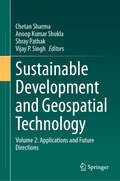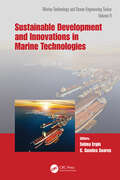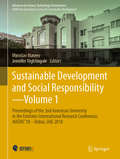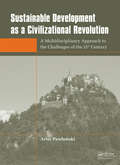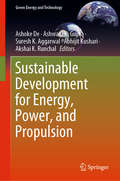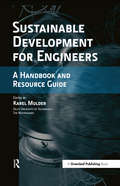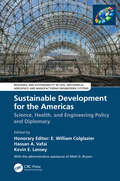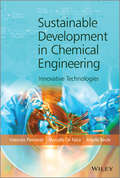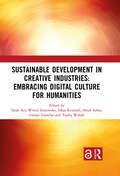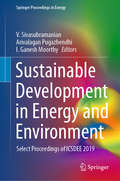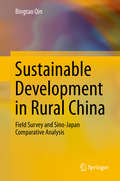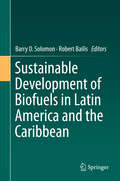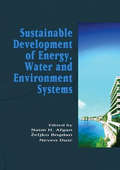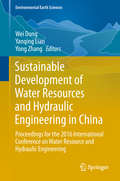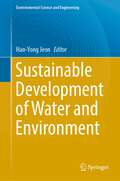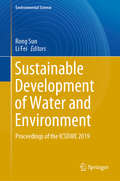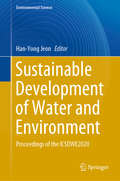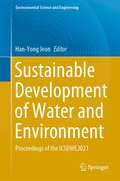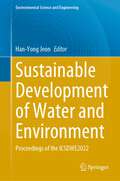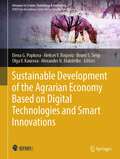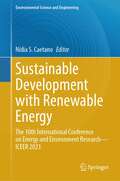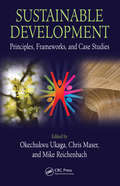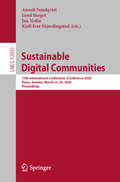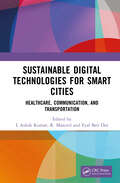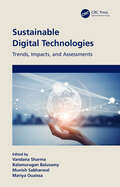- Table View
- List View
Sustainable Development and Geospatial Technology: Volume 2: Applications and Future Directions
by Vijay P. Singh Chetan Sharma Anoop Kumar Shukla Shray PathakThis two-volume set showcases the various ways in which geospatial technology can be used to achieve sustainable development goals across different sectors such as urban planning, natural resource management, agriculture, disaster management, and energy management. The books provide insights into the potential of geospatial technology in promoting sustainable development practices and addressing challenges related to climate change, environmental degradation, and socio-economic development. Both volumes together are a comprehensive guide that showcases the potential of geospatial technology in promoting sustainable development practices across different sectors, and will serve as an essential resource for professionals, policymakers, researchers, and students interested in sustainable development and geospatial technology.Volume 2 explores practical applications, insightful case studies, and emerging trends within the dynamic intersection of sustainable development and geospatial technology. Delving into the critical domain of water resources and agriculture, it scrutinizes the application of geospatial tools in river basin management, integrated water resources management (IWRM), sustainable agriculture, and precision agriculture. The volume then shifts its focus to disaster management, energy, and the future, encompassing geospatial data science for disaster resilience, Earth observation for sustainable energy management, and diverse case studies that highlight the impact of geospatial technology on sustainable development. Moreover, it ventures into environmental monitoring and analysis, discussing topics like land use planning, climate change mitigation, environmental monitoring technology, and socioeconomic inequalities.
Sustainable Development and Innovations in Marine Technologies: Proceedings of the 19th International Congress of the International Maritime Association of the Mediterranean (IMAM 2022), Istanbul, Turkey, September 26–29, 2022 (Proceedings in Marine Technology and Ocean Engineering)
by Selma ErginSustainable Development and Innovations in Marine Technologies includes the papers presented at the 19th International Congress of the International Association of the Mediterranean (IMAM 2022, Istanbul, Turkey, 26-29 September 2022), one of the major conferences in maritime industry. The Congress has a history of more than forty years since the first Congress was held in Istanbul in 1978. IMAM 2022 is the fourth congress hosted by Istanbul in its history. The IMAM congresses concentrate their activities in the thematic areas of Ship Building and Repair; Maritime Transportation and Logistics; Hydrodynamics, Marine Structures; Machinery and Control, Design and Materials; Marine Environment; Safety of Marine Systems; Decarbonisation and Digitalization; Off-shore and Coastal Development; Noise and Vibration; Defense and Security; Off-shore Renewable Energy.Sustainable Development and Innovations in Marine Technologies is essential reading for academics, engineers and all professionals involved in sustainable and innovative marine technologies.
Sustainable Development and Social Responsibility—Volume 1: Proceedings of the 2nd American University in the Emirates International Research Conference, AUEIRC'18 – Dubai, UAE 2018 (Advances in Science, Technology & Innovation)
by Miroslav Mateev Jennifer NightingaleThe book presents high-quality research papers presented at the 2nd American University in the Emirates International research conference, AUEIRC'18, organized by the American University in the Emirates, Dubai, held on November 13th-15th, 2018. The book is broadly divided into four sections: Sustainability and Smart Technology, Sustainability and Social Responsibility, Sustainability, Human Security and Legislation, Sustainability and Education. The topics covered under these sections are sustainable smart technology such as developing green curriculum for information technology, use ultrasonic velocity to predict quality of wheat, improve security features for visa system, factors affecting the cost of production of electricity and desalination plants, impact of smart traffic sensing in smart cities, smart healthcare system, simulation of Grey wolf optimization algorithm in painting digital forensics. The topics covered for sustainability and creative industries such as sustainable concrete production, multimedia applications in digital transformation art, integrating biomimicry principles in sustainable architecture. Sustainability, human security and legislation covered topics of urban performance and sustainable environment, Eco-certification as response on climate change, the criminal offence of tax evasion in law: case study, skills engineering in sustainable counter defense against Cyber extremism, the international law and challenges of trans-boundary water resources governance, the legal status of nuclear energy: case study, sustainable energy development and nuclear energy legislation in UAE, corruption specific safety challenge, environmental management and sustainability, sustainable farming models for desert agro-ecosystems, future directions of climate change, earth and built environment towards new concept of sustainability, institution building from emotional intelligence perspective, virtue ethics, technology and sustainability, the role of humor in a sustainable education, HEIs practices and strategic decisions toward planning for sustainable education programs, TQM in higher education for sustainable future. The papers in this book present high-quality original research work, findings and practical development experiences.
Sustainable Development as a Civilizational Revolution: A Multidisciplinary Approach to the Challenges of the 21st Century
by Artur PawlowskiAs a concept, sustainable development is in conflict with traditional development based upon economic growth. Sustainable development is an attempt to formulate a programme that integrates different aspects (ecological, social, and economical) which were usually considered as separate from each other. Sustainable Development as a Civilizationa
Sustainable Development for Energy, Power, and Propulsion (Green Energy and Technology)
by Ashwani K. Gupta Suresh K. Aggarwal Abhijit Kushari Akshai K. Runchal Ashoke DeThis book comprises state-of-the-art advances in energy, combustion, power, propulsion, environment, focusing on the production and utilization of fossil fuels, alternative fuels and biofuels. It is written by internationally renowned experts who provide the latest fundamental and applied research innovations on cleaner energy production as well as utilization for a wide range of devices extending from micro scale energy conversion to hypersonic propulsion using hydrocarbon fuels. The tailored technical tracks and contributions are portrayed in the respective field to highlight different but complementary views on fuels, combustion, power and propulsion and air toxins with special focus on current and future R&D needs and activities. This book will serve as a useful reference for practicing engineers, research engineers and managers in industry and research labs, academic institutions, graduate students, and final year undergraduate students in mechanical, chemical, aerospace, energy, and environmental engineering.
Sustainable Development for Engineers: A Handbook and Resource Guide
by Karel MulderIt is crucial that engineers – from students to those already practising – have a deep understanding of the environmental threats facing the world, if they are to become part of the solution and not the problem. Is there a way to reconcile modern lifestyles with the compelling need for change? Could new improved technologies play a key role? If great leaps in the environmental efficiency of technologies are needed, can they be produced? Engineers are in a privileged and hugely influential position to innovate, design and build a sustainable future. But are they engaged or uninterested? Are they knowledgeable or ignorant? This book has been developed by a number of committed educators in European engineering departments under the leadership of Delft University of Technology and the Technical University of Catalunya to meet the perceived gap between what engineers know and what they should know in relation to sustainable development. The University of Delft decided as long ago as 1998 that all of its engineering graduates, working towards careers as designers, managers or researchers, should be prepared for the challenge of sustainable development and, as such, should leave university able to make sustainable development operational in their designs and daily practices. The huge amount of knowledge gathered on best-practice teaching for engineers is reflected in this book. The aim is to give engineering students a grounding in the challenge that sustainable development poses to the engineering profession, the contribution the engineer can make to attaining some of the societal and environmental goals of sustainability, and the barriers and pitfalls engineers will likely need to confront in their professional lives. Concise but comprehensive, the book examines the key tools, skills and techniques that can be used in engineering design and management to ensure that whole-life costs and impacts of engineering schemes are addressed at every stage of planning, implementation and disposal. The book also aims to demonstrate through real-life examples the tangible benefits that have already been achieved in many engineering projects, and to highlight how real improvements can be, and are being, made. Each chapter ends with a series of questions and exercises for the student to undertake. Sustainable Development for Engineers will be essential reading for all engineers and scientists concerned with sustainable development. In particular, it provides key reading and learning materials for undergraduate and postgraduate students reading environmental, chemical, civil or mechanical engineering, manufacturing and design, environmental science, green chemistry and environmental management.
Sustainable Development for the Americas: Science, Health, and Engineering Policy and Diplomacy (Resilience and Sustainability in Civil, Mechanical, Aerospace and Manufacturing Engineering Systems)
by E. William ColglazierEnvironmental sustainability efforts require a great deal of engagement and political will, ranging from local communities to state departments. Science diplomats—from experts and scientists to spokespersons and ambassadors—can help facilitate at all levels and yield valued resources from technology sharing, capacity building, and knowledge exchanges. This book explores the importance of sustained international scientific cooperation, building community resilience, and the role of political will in sustainability and diplomacy. It shows how even small diplomatic efforts can influence myriad issues, from overfishing to human rights negotiations to global carbon emission reduction. Features: • Examines various topics such as global climate change, arid environments, water security and governance, trans-boundary conflict and cooperation, urban and rural resilience, and public health. • Presents case studies from various geographic regions through the lens of diplomacy, including the US–Mexico border, the Gulf of California, South America, Europe, the Middle East, Central and South Asia, and China. • Discusses how building networks of people, organizations, and countries engaged in science diplomacy is crucial for mutual growth and for overcoming conflicting political stances. Sustainable Development for the Americas: Science, Health and Engineering Policy and Diplomacy provides a useful resource for diplomats, policymakers, students, and decision-makers. It provides numerous examples of how using science and technology for policy and diplomacy is essential to finding common ground among nations for a collective global benefit.
Sustainable Development in Chemical Engineering
by Marcello De Falco Angelo Basile Vincenzo PiemonteSustainable development is an area that has world-wide appeal, from developed industrialized countries to the developing world.<P><P> Development of innovative technologies to achieve sustainability is being addressed by many European countries, the USA and also China and India. The need for chemical processes to be safe, compact, flexible, energy efficient, and environmentally benign and conducive to the rapid commercialization of new products poses new challenges for chemical engineers. This book examines the newest technologies for sustainable development in chemical engineering, through careful analysis of the technical aspects, and discussion of the possible fields of industrial development. <P>The book is broad in its coverage, and is divided into four sections: Energy Production, covering renewable energies, innovative solar technologies, cogeneration plants, and smart grids Process Intensification, describing why it is important in the chemical and petrochemical industry, the engineering approach, and nanoparticles as a smart technology for bioremediation Bio-based Platform Chemicals, including the production of bioethanol and biodiesel, bioplastics production and biodegradability, and biosurfactants Soil and Water Remediation, covering water management and re-use, and soil remediation technologies Throughout the book there are case studies and examples of industrial processes in practice.
Sustainable Development in Creative Industries: PROCEEDINGS OF THE 9TH BANDUNG CREATIVE MOVEMENT INTERNATIONAL CONFERENCE ON CREATIVE INDUSTRIES (BCM 2022), BANDUNG, INDONESIA, 1 SEPTEMBER 2022
by Idhar Resmadi Hanif Azhar Ganjar Gumilar Taufiq Wahab Wiwid Sintowoko, Dyah AyuThis book provides the thoughtful writings of a selection of authors illustrating a central concept: Sustainable Development in Creative Industries, which utilizes a monetary equilibrium addressing issues, particularly those associated with the use of an integrated area in cyberspace and physical space, and their effect on the creative industries. 15 universities from Asia and Europe have participated in the 9th Bandung Creative Movement, where this topic was explored. Sustainability issues are now at the forefront of progress. The book covers four main areas. The first section, entitled "Art, Culture, and Society," delves into the various sectors that contribute to building a more sustainable environment, including the arts and culture. Whereas, "Design and Architecture" is referring to cutting-edge practices in the fields of manufacturing, transportation, interior design, and building construction. The third section "Technology and New Media" delves into the transformation of technology into a new medium for the development of the creative industries. The final section, "management and Business," discusses an innovative perspective on the state of the market and management in the sector. Anyone interested in the intersection of creative industries, sustainability, and digital cultures would benefit intellectually from reading this book. The Open Access version of this book, available at http://www.taylorfrancis.com, has been made available under a Creative Commons Attribution-Non Commercial-No Derivatives (CC-BY-NC-ND) 4.0 license. Funded by Telkom University, Indonesia.
Sustainable Development in Energy and Environment: Select Proceedings of ICSDEE 2019 (Springer Proceedings in Energy)
by V. Sivasubramanian Arivalagan Pugazhendhi I. Ganesh MoorthyThis book presents select peer-reviewed proceedings of the International Conference on Sustainable Development in Energy and Environment (ICSDEE) 2019. The focus is on novel research in renewable energy resources and environmental issues and their implementation in augmenting sustainable development. This book includes chapters on solutions to problems faced by countries across the globe in the energy sector, pollution treatment processes, and other socially relevant topics like the possibility of extracting energy from the inexhaustible waste stream, waste disposal, waste management etc. This book will be useful for students, researchers as well as professionals interested in sustainable technologies, green energy, and biotechnology.
Sustainable Development in Rural China
by Bingtao QinThe book provides a study of sustainable development in rural China. Because of its huge population and vast land area, this is an important issue not only for China but for the whole world. The research presented is both multi aspect and systematical. It can be likened to a tree where the trunk is the three main aspects: economy, environment and rural society, and the five main branches are agricultural development, industrial pollution, energy security, labor migration and social welfare, and these are the book's five main topics. The research methods of field survey and Sino-Japanese comparison will be of particular interest to readers. The field survey enables readers to become familiar with the environment of rural China. Survey reports and data provide readers with a more profound and vivid understanding of rural China and comparative methods benefit readers from different countries and a variety of cultural backgrounds. For Japanese readers or readers who understand Japanese well, they make China more easily understandable, while Chinese readers gain insights into the country's future and the direction of current developments based on a Japanese frame of reference. For readers outside China and Japan, this book serves as an introduction to Chinese society and also to Japan. Finally, the author provides various paradigmatic scenarios, including default and sustainable. After reading this book, readers will be aware that the earlier and the more we pay attention to these issues, the easier it will be for rural China to achieve a sustainable situation.
Sustainable Development of Biofuels in Latin America and the Caribbean
by Barry D. Solomon Robert BailisThis book examines recent developments in Latin American biofuel production. Taking "sustainable development" as a central theme, each chapter considers one country in the region and explores how biofuel production is evolving given concerns about food sovereignty, trade and other social issues. Environmental conservation, as well as an increasingly complex and globalized economic structure, Is also taken into account. The contributions to this volume critically explore the ways in which biofuel production in Latin America impact social, economic and environmental systems: the so-called "three pillars of sustainability". Numerous stakeholders, drawn from government, industry, civil society and academia have attempted to define "Sustainable Development" in the context of biofuel production and to operationalize it through a series of principles, criteria, and highly specific indicators. Nevertheless, it remains a fluid and contested concept with deep political and social ramifications, which each chapter explores in detail.
Sustainable Development of Energy, Water and Environment Systems
by Naim H. Afgan Željko Bogdan Neven DuićThis work contains a collection of selected, peer-reviewed papers that were presented at the First Dubrovnik Conference on Sustainable Development of Energy, Water and Environment Systems, held in Dubrovnik, Croatia in 2002. This conference was focussed on the following objectives: More...to discuss sustainability concepts of energy, water and envi
Sustainable Development of Water Resources and Hydraulic Engineering in China: Proceedings For The 2016 International Conference On Water Resource And Hydraulic Engineering (Environmental Earth Sciences Ser.)
by Yong Zhang Wei Dong Yanqing LianThis book presents the gatherings of the “2016 International Conference on Water Resource and Hydraulic Engineering,” which primarily focused on the sustainable development of water resources and the environment in both China and the United States. The respective papers cover a wide variety of research areas, including watershed hydrology; river hydraulics; groundwater hydrology; water resources management and sustainability development; water supply planning under climate change; water quality analysis and water pollution; sponge city development and urban watershed management; environment and sustainability; global connections between air and water; and irrigation and drainage issues for agricultural engineering. The contributions will be of interest to a global readership and highlight the emerging problems facing developing countries, as well as research and measures to successfully deal with them and promote a greener and more eco-friendly living environment.
Sustainable Development of Water and Environment (Environmental Science and Engineering)
by Han-Yong JeonThis book aims to offer new scientific concept in the field of water and environment. The main purpose of this book is to exchange some of the latest research findings and educational information on the water and environment in order to take important measures to protect water resources and the environment for future generations in accordance with the principles of sustainable development. The book welcomes all related research and review papers and hopes ICSDWE can positively impact our world and provide a better future for all, including the improvement to the quality of life.
Sustainable Development of Water and Environment: Proceedings of the ICSDWE 2019 (Environmental Science and Engineering)
by Rong Sun Li FeiThis book covers the full spectrum of water and environment conservation, offering management lessons, identifying the barriers to transformative change, and then presenting agendas and initiatives for sustainable global water and environment management. Water is a unique resource and is vital to human beings and ecosystems. At the same time, it is a driver of growth and development. However, in a changing world factors such as rapid population growth and urbanization are having an increasing impact on water and the environment, and managing critical water resources sustainably represents an unprecedented and urgent challenge. As such, the book describes innovative approaches that can be used to support the operationalization and delivery of sustainable water and environment management. ICSDWE 2019 is dedicated to sustainable water and environment, with a focus on the water resources management, wastewater treatment and environmental protection. Sharing current knowledge and recent developments, experiences and lessons learned, it stimulates discussion and reflection, to promote a paradigm shift toward sustainable water and environment management.
Sustainable Development of Water and Environment: Proceedings of the ICSDWE2020 (Environmental Science and Engineering)
by Han-Yong JeonThis book focuses on water resources and the economic, financial, social and environmental impacts (ICSDWE) of global warming and climate change. It discusses the links between these aspects and presents cutting-edge research, technology, and practice in these fields. The book is a valuable resource for students and researchers at government organizations, academic institutions, and NGOs.
Sustainable Development of Water and Environment: Proceedings of the ICSDWE2021 (Environmental Science and Engineering)
by Han-Yong JeonThis book addresses the improvement and dissemination of knowledge on methods, policies and technologies for increasing the sustainability of development by de-coupling growth from natural resources and replacing them with knowledge-based economy, taking into account its economic, environmental and social pillars, as well as methods for assessing and measuring sustainability of development, regarding water and environment. This book gathers scholar and experts in related fields. All attendees from a vast range of companies, universities and government institutions acquire advanced technical knowledge and are introduced to new fields through discussions that focus on their own specialties as well as a variety of interdisciplinary areas. The authors hope most of scholars can find what they really need in this book.
Sustainable Development of Water and Environment: Proceedings of the ICSDWE2022 (Environmental Science and Engineering)
by Han-Yong JeonThis book of ICSDWE2022 aims to advance the understanding of both the fundamentals of related fields in sustainable development of water and environment and its application to the solution of challenges and problems in engineering. The committee of ICSDWE2022 gathers scholars and experts in related fields both at home and abroad. Under the guidance of the committee, we are confident to the publication of high-quality papers on all aspects of water and environment. The book features graduate-level texts and professional books in related fields. We hope that most scholars, researchers, and engineers can find what they really need in our book.
Sustainable Development of the Agrarian Economy Based on Digital Technologies and Smart Innovations (Advances in Science, Technology & Innovation)
by Elena G. Popkova Aleksei V. Bogoviz Bruno S. Sergi Olga V. Kaurova Alexander N. MaloletkoThis book elaborates on the modern experience and prospects and the development of recommendations for sustainable development of the agrarian economy based on digital technologies and smart innovations for the provision of food security. This book dwells on the global and regional challenges for food security and answers to them through the sustainable development of the agrarian economy. The book also studies the international experience of sustainable development of the agrarian economy on the basis of digital technologies and advantages for food security. Sustainable development of the agrarian economy with the use of digital technologies—as the foundation of food security of Central Asia—is considered. The prospects for provision of food security through the use of smart innovations for the sustainable development of the agrarian economy are outlined. A set of applied recommendations for raising the effectiveness of the use of smart innovations for the sustainable development of the agrarian economy is proposed.
Sustainable Development with Renewable Energy: The 10th International Conference on Energy and Environment Research—ICEER 2023 (Environmental Science and Engineering)
by Nídia S. CaetanoThis proceedings book contains the full papers of the 10th edition of the International Conference on Energy and Environment Research, ICEER 2023, that took place in Madrid, Spain during October 7–9, 2023. ICEER 2023 is a joint organization of the School of Engineering (ISEP) of the Polytechnic of Porto (P.Porto) and the SCIEI, with collaboration of the Dipartimento di Ingegneria of the Università degli studi "Roma Tre", CIETI and LEPABE research groups. This book includes all the well prepared full papers presented at ICEER 2023.
Sustainable Development: Principles, Frameworks, and Case Studies
by Chris Maser Okechukwu Ukaga Mike ReichenbachCoined in the 1970s, the term sustainable development and the ideas behind it have enjoyed varying amounts of popularity over the years. And while dire predictions abound, the full impacts of global warming are not known, nor can they be known. What we do know is that to be sustainable, all societies must adjust to new realities, which include chan
Sustainable Digital Communities: 15th International Conference, iConference 2020, Boras, Sweden, March 23–26, 2020, Proceedings (Lecture Notes in Computer Science #12051)
by Anneli Sundqvist Gerd Berget Jan Nolin Kjell Ivar SkjerdingstadThis volume constitutes the proceedings of the 15th International Conference on Sustainable Digital Communities, iConference 2020, held in Boras, Sweden, in March 2020. The 27 full papers and the 48 short papers presented in this volume were carefully reviewed and selected from 178 submissions. They cover topics such as: sustainable communities; social media; information behavior; information literacy; user experience; inclusion; education; public libraries; archives and records; future of work; open data; scientometrics; AI and machine learning; methodological innovation.
Sustainable Digital Technologies for Smart Cities: Healthcare, Communication, and Transportation
by L Ashok Kumar, R. Manivel and Eyal Ben DorThis book focuses on recent and emerging techniques for the enhancement of smart healthcare, smart communication, and smart transportation systems. It covers topics ranging from Machine Learning techniques, the Internet of Things (IoT), security aspects of medical documents, the performance of various protocols used in the communication and transportation environment, simulation of systems for real-time applications, and overall analysis of the previously mentioned. Applications such as transportation systems, stock market prediction, Smart Cities, and vehicular communication are dealt with. Features: Covers three important aspects of smart cities i.e., healthcare, smart communication and information, and smart transportation technologies. Discusses various security aspects of medical documents and the data preserving mechanisms. Provides better solutions using IoT techniques for healthcare, transportation, and communication systems. Includes the implementation example, various datasets, experimental results, and simulation procedures. Offers solutions for various disease prediction systems with intelligent techniques. This book is aimed at researchers and graduate students in computer science, electrical engineering, and data analytics.
Sustainable Digital Technologies: Trends, Impacts, and Assessments
by Vandana Sharma, Balamurugan Balusamy, Munish Sabharwal, and Mariya OuaissaThis book is a reference on digital technology and its impact on sustainability, providing insight into sustainable practices globally. It focuses on the critical practices leading to sustainable initiatives among various organizations, IT infrastructure, communities, and government compliance. The book describes the green computing paradigms and the impact of a circular economy with a focus on sustainable practices in a post-pandemic world. Sustainable Digital Technologies: Trends, Impacts, and Assessments discusses the critical factors leading to sustainable initiatives in a global economy. It highlights the impact of digital technology and Industry 4.0 in today’s world. The book focuses on the role, responsibility, and the effect of the Internet of Things for digital sustainability and practices. It describes implementation strategies for green cloud computing and presents additional strategies for sustainable practices in a post-pandemic world. This publication is designed for use by technology development academicians, data scientists, industrial professionals, researchers, and students interested in uncovering the latest innovations in the field and the current research on problem-oriented processing techniques in sustainable and evolutionary computing applications with reduced energy channelization.
